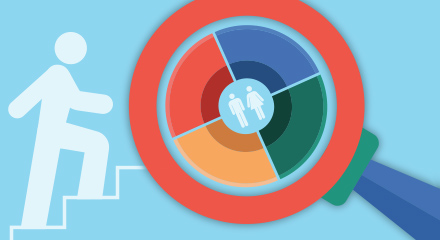OMG!!! THINK BEFORE SENDING THAT TEXT
Posted 3/21/2020“Oh, boy,” said Chris, one of our Recruiter Associates, while reading something on his computer screen one morning recently. I asked him what it was, and he said it was an e-mail he’d just gotten from a candidate (we’ll call him “Dennis” to protect the guilty) whom we had recently introduced to a northeastern lighting company that focuses on the national accounts market.
Dennis had forwarded our Recruiter Associate the thank-you note (e-mail), which had been sent to that company. I stepped over to see what Chris was reading. The thank-you note read: “Dear Steve, It was good meeting you. Just wanted to say that i really enjoyed our conversation. The opportunity is very exciting and i look forward to hearing from you soon. . .” I was looking for a more obvious typo, a clear misspelling, so at first glance I didn’t catch it. However, after reading more closely for a couple of seconds I saw it: Dennis had not capitalized the word “I.”
While typos in an outgoing e-mail are never a positive thing (particularly in a thank-you note to a potential employer), I began to wonder, was this a typo by the candidate (forgetting to capitalize the word ‘I’) or had the candidate intentionally used the lowercase for effect? (A side note: when typing this just now, my computer automatically corrected me when I tried to type the word “I” in lower case, so it seemed almost impossible to do this accidentally.) Did Dennis’s computer not have a version of spell-check? Our Recruiter Associate then mentioned that he had introduced Dennis to another company (a highly respected residential lighting fixture manufacturer). He pulled up his copy of that thank-you note and found the same misspelling.
Dennis’s e-mail is just one example but it clearly points to the importance of clear, appropriate and succinct written communications— especially with thank-you notes from candidates to companies. What we saw with Dennis’s e-mail, though, is part of a generational trend. While we’re discussing this in the context of the lighting industry, this technical generation gap is by no means limited to our profession. In the case of Dennis’s e-mail, he simply took what is commonplace in texting and instant messaging (the “i” and “u” for “I” and “you” as texting shorthand or slang—i.e., “text speak,” a new term to denote the shorthand style of many Gen-Nexters or Gen Y’ers). The Urban Dictionary (www.urbandictionary.com) defines text speak as “the process of shortening words and adding numbers to a text message to make it ‘cooler.’ This form of text messaging is highly annoying and can also be used to sell ‘trendy’ products like 50cc scooters and mobile phones. Often involves leaving out all vowels.”
BAD CAREER MOVE
Our candidate Dennis either deliberately or unintentionally transferred this style of writing to a thank-you note to an employer— not a good play. Eileen Gunn (who writes a jobs column for www.examiner.com) said this about the disparity between Gen Y candidates and hiring managers and interviewers, who are often a generation or two apart: “I have to come down on the side of the dowdy managers this time around, despite my belief that there are all sorts of great business uses for texting, IM-ing, blogging and online social networks.” Gunn goes on to write: “Some Gen Y’ers push the electronic envelope too far by texting their thank-you’s. Or they take the time to e-mail, but let the shorthand fly as though they’re gossiping with their BFF instead of trying to impress a grown-up who is considering giving them paycheck.” That being said, though, Gunn correctly points out “that older workers who dismiss them out of hand are not long for this work force.”
I read with great interest a column in the Wall Street Journal that talked about job-search trends among Gen Y’ers or Gen- Nexters. WSJ’s Sarah Needleman spoke with David Holtzman, author of Privacy Lost: How Technology Is Endangering Your Privacy, who says that the generational chasm regarding text messaging “. . .is driven by the communication technology that each generation has grown up with. Workers in their ‘20s and younger are accustomed to online and cell phone messaging, and the abbreviated lingua franca that makes for quick exchanges. It’s just natural for them. They don’t realize that it’s perceived to be disrespectful.”
That WSJ article also mentioned a recruiter with a well-known firm specializing in placing recent college graduates who points out that his firm’s hiring managers wonder when they see someone texting in a business environment whether this sort of unprofessional communication will follow the candidate into the workplace. This recruiter sees emoticons (hearts, smiley faces, etc.) appearing in 10 percent of the e-mails he receives from candidates.
This may sound very old school, but I don’t think smartphones/texting devices should be used when writing a thank-you note to a potential employer. Don’t get me wrong, my wife and our six-year-old son are both ardent fans of her iPhone. (If possession is 9⁄10 of the law, then it may actually be his; I never knew how many free cartoons were available on YouTube until he got his little hands on her phone.) Until about two years ago, I continued to use a “dumb phone,” as opposed to a “smart” one. I am in front of computer either on the phone or sending/ receiving e-mails literally nine to 11 hours per day, five to six days a week, so for me to have some down time where I can’t receive an e-mail isn’t the end of the world. So, I now take full advantage of the many features of my iPhone except that I don’t receive e-mails on it.
The reasons for not using a smart-phone device to write a thank-you note following an interview include: 1) written communications on a smart phone are frequently with friends, lending a casual tone that may affect someone’s approach/thought process when using it for an important business/career e-mail; 2) smart phones by nature are often used on-the-go; as we all know, things done in haste or in a rushed environment are a breeding ground for typos and errors. So, in short, save your thank-you note until you get to your hotel or back home. The opportunity to write the e-mail in a relaxed, quiet environment usually makes for a much for effective followup to that great interview you just had.
It will be interesting to see how the generation gap in communications unfolds, say, 10 to 20 years from now when Gen Y’ers move from candidate roles to those of hiring managers. Will we see a change in the guidelines for what is and isn’t appropriate for an after-interview thank-you note? Until that day, though, “Hiya,” “Thanx,” smiley faces (:)) and all other emoticons and text slang should be used for your e-mails and/ or texts with your BFF only.
And with that allow me to say B4N— AYK, I’ll BRB here Q1. For the older members of our crowd and/or textphobics, translation: Bye for now—as you know, I’ll be right back in 3 months.
OMG!!! Think Before Sending That Text
(146 KB)
Reproduced with the permission of LD+A



